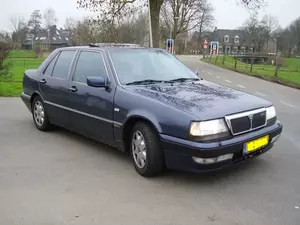
| Vehicle | Curb weight | Difference from world's smallest | Weight to power ratio | 0—60 mph acceleration ratio | Consumption ratio |
|---|---|---|---|---|---|
| 2000 16V |
1250 kg / 2756 lbs |
825 kg (1819 lbs) heavier | 8 kg to 1 hp | 139 kg/s (306 lbs/s) |
152 kg/L (335 lbs/L) |
| 2850 V6 i.e. |
1280 kg / 2822 lbs |
855 kg (1885 lbs) heavier | 9 kg to 1 hp | 160 kg/s (353 lbs/s) |
136 kg/L (300 lbs/L) |
| 2000 16V Turbo |
1285 kg / 2833 lbs |
860 kg (1896 lbs) heavier | 7 kg to 1 hp | 169 kg/s (373 lbs/s) |
143 kg/L (315 lbs/L) |
| 2000 i.e. |
1230 kg / 2712 lbs |
805 kg (1775 lbs) heavier | 10 kg to 1 hp | 123 kg/s (271 lbs/s) |
146 kg/L (322 lbs/L) |
| 2500 Turbo DS |
1350 kg / 2977 lbs |
925 kg (2040 lbs) heavier | 11 kg to 1 hp | 129 kg/s (284 lbs/s) |
193 kg/L (426 lbs/L) |
| 8.32 |
1400 kg / 3087 lbs |
975 kg (2150 lbs) heavier | 7 kg to 1 hp | 206 kg/s (454 lbs/s) |
133 kg/L (293 lbs/L) |
| Vehicle | 2000 16V |
|---|---|
| Curb weight |
1250 kg / 2756 lbs |
| Difference from world's smallest | 825 kg (825 lbs) heavier |
| Weight to power ratio | 8 kg to 1 hp |
| 0—60 mph acceleration ratio | 139 kg/s (306 lbs/s) |
| Consumption ratio |
152 kg/L (335 lbs/L) |
| Vehicle | 2850 V6 i.e. |
| Curb weight |
1280 kg / 2822 lbs |
| Difference from world's smallest | 855 kg (855 lbs) heavier |
| Weight to power ratio | 9 kg to 1 hp |
| 0—60 mph acceleration ratio | 160 kg/s (353 lbs/s) |
| Consumption ratio |
136 kg/L (300 lbs/L) |
| Vehicle | 2000 16V Turbo |
| Curb weight |
1285 kg / 2833 lbs |
| Difference from world's smallest | 860 kg (860 lbs) heavier |
| Weight to power ratio | 7 kg to 1 hp |
| 0—60 mph acceleration ratio | 169 kg/s (373 lbs/s) |
| Consumption ratio |
143 kg/L (315 lbs/L) |
| Vehicle | 2000 i.e. |
| Curb weight |
1230 kg / 2712 lbs |
| Difference from world's smallest | 805 kg (805 lbs) heavier |
| Weight to power ratio | 10 kg to 1 hp |
| 0—60 mph acceleration ratio | 123 kg/s (271 lbs/s) |
| Consumption ratio |
146 kg/L (322 lbs/L) |
| Vehicle | 2500 Turbo DS |
| Curb weight |
1350 kg / 2977 lbs |
| Difference from world's smallest | 925 kg (925 lbs) heavier |
| Weight to power ratio | 11 kg to 1 hp |
| 0—60 mph acceleration ratio | 129 kg/s (284 lbs/s) |
| Consumption ratio |
193 kg/L (426 lbs/L) |
| Vehicle | 8.32 |
| Curb weight |
1400 kg / 3087 lbs |
| Difference from world's smallest | 975 kg (975 lbs) heavier |
| Weight to power ratio | 7 kg to 1 hp |
| 0—60 mph acceleration ratio | 206 kg/s (454 lbs/s) |
| Consumption ratio |
133 kg/L (293 lbs/L) |